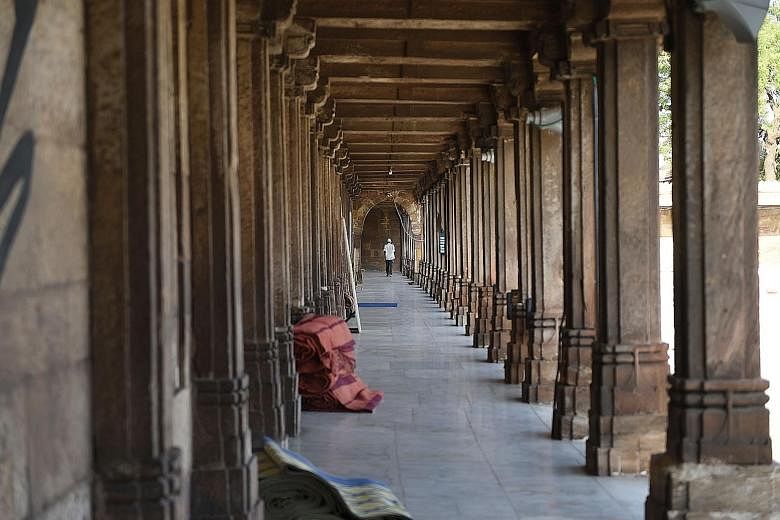Ms Saba Altaf Shaikh usually prepares for Ramadan by planning special meals for her husband and two children.
The 34-year-old buys mutton, chicken, buttery sweet and salty biscuits called Nankhatai, rose sherbet, milk vermicelli or vermicelli pudding and other ingredients for those meals.
But with Ramadan falling in the midst of a strict lockdown in India, which will last until Sunday, the Mumbai housewife has not been able to get many of the ingredients or food items for sehri, the pre-dawn meal, or for iftar, the ending of the fast at dusk.
There are shortages of food items due to a supply chain greatly disrupted by the lockdown.
Mumbai, the country's financial capital and the city most affected by Covid-19 in India, accounts for over 4,025 cases.
Mutton, a staple food, is off Ms Shaikh's menu after market prices doubled to over 400 rupees (S$7.50) per kilo. And there is no question of buying food from restaurants or food stalls, which have been shut.
"We usually prepare so many things and get food from outside. It's harder to get things now. But it's okay. The main thing is prayer and reciting the Quran. This thing is with us," she said, adding that her husband, who is working in a hotel, is also facing salary disruptions. Her two children, aged eight and 10, are also observing the fast.
"Because of the lockdown, we cannot recite namaz (prayers) in mosques. It's disheartening for Muslims. But what can we do? For our family and for the good of the people we can't go out.
"We are praying that before Eid, lockdown would (end) and the virus... banished from the country," she said.
In India, Muslim leaders have asked the community to offer Ramadan prayers and perform the necessary rituals at home.
Some top Muslim scholars and religious leaders have also jointly issued guidelines for how the community should navigate this Ramadan, which has upended centuries of tradition.
They have appealed to Muslims to focus on understanding the Quran, pray at home and avoid gatherings for sehri and iftar, iftar parties, marketplaces and pre-iftar shopping.
"People are coping well. They understand restrictions are for their own good and the community's. Nobody is complaining," said Dr Zafarul-Islam Khan, chairman of the Delhi Minorities Commission, one of the leaders behind this appeal.
"Of course the celebratory mood, which is seen at night after the fast is broken, (is affected). Markets in Muslims areas would be bursting past midnight. There would be no place to walk. All this has changed."
There are around 195 million Muslims in India, accounting for 12 per cent of the country's population of 1.3 billion.
Many are planning to celebrate online with friends and family.
"Certainly, the communication medium has become online in this moment of crisis. At least you can see pictures and videos of friends and family, since there is no opportunity to sit together. Video call and chat will be the only opportunity for most of us," said Dr Aftab Alam, associate professor at Aligarh Muslim University in Uttar Pradesh.
"People are worried (by the pandemic)," he added.
India has confirmed 26,283 Covid-19 cases and 779 fatalities as of last Saturday. Still, this Ramadan, the Muslim community is also feeling the additional pressure of sticking to the rules.
Ramadan has also seen religious fault lines widen after a meeting of the Tablighi Jamaat, a Muslim missionary movement, at its Delhi headquarters became a super spreader event.
Some 30 per cent of all coronavirus cases in India have been linked to the Jamaat, giving Hindu religious hardliners an opportunity to target the entire Muslim community and accuse them of spreading the virus. A video clip of a vendor being asked to go home after revealing his Muslim identity went viral earlier this month. Such incidents have led to a sense of discomfort in the community.
Dr Khan said: "People know they have to come to terms with it (communalisation) and try to cope with these things."
"We are taking it in our stride. A 200-million Muslim community cannot be cowed. Even non-Muslims have stood up and said this is bad for democracy and secularism. Those who think they can put us down (should know) it's not possible," he added.












